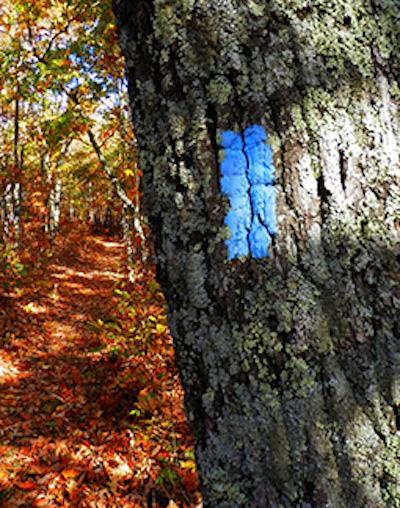
The House Natural Resources Committee has passed out legislation that, if enacted, would allow mountain bikes to use trails in wilderness areas, such as in Shenandoah National Park's official wilderness traversed by the Big Run Trail/NPS
Wilderness areas, long the domain of muscle-powered recreation without mechanical aids, would be open to mountain bikes and other wheeled items under legislation approved by the House Natural Resources Committee.
Wilderness boundaries long have been an irritant to some in the mountain bike community, as they see vast new landscapes to explore but which are just out of reach. While some in that community have "poached" wilderness areas, others have long worked to get legislation passed to remove the ban against bikes.
The pending measure, H.R. 1349, was introduced by U.S. Rep. Tim McClintock, a Republican from California.
“This bill advances one of the principal objectives of the Federal Lands Subcommittee: to restore public access to our public lands. When the House considered the Wilderness Act in June of 1964, the record is clear that its framers intended that the term 'mechanical transport' be applied to non-human-powered vehicles like motorcycles – not human-powered devices like bicycles," Mr. McClintock said after the House committee approved his measure this week.
"Bicycles were allowed in wilderness areas from the inception of the act in 1964 until 1977, when the Forest Service reinterpreted the act to ban them. Bicycles peacefully co-exist with backpacking, hiking, horseback riding and packing on any other public lands – and they did for many years in Wilderness areas," he added. "This bill only removes the current blanket prohibition against bicycles and other forms of human-powered locomotion established by bureaucratic regulation. It in no way interferes with the discretion provided in other regulations and laws that gives land managers the ability to close or restrict the use of trails according to site-specific conditions. This bill restores this principle for America’s mountain bikers on our public lands.”
In lobbying for the measure's passage earlier this year, the Sustainable Trails Coalition argued that there was never an intent to ban bicycles from official wilderness.
The wording of the act signed by President Johnson in 1964 clearly states that, "there shall be no temporary road, no use of motor vehicles, motorized equipment or motorboats, no landing of aircraft, no other form of mechanical transport, and no structure or installation within any such area."
But the Coalition, and now Rep. McClintock, pointed to a rule the U.S. Forest Service adopted two years later to implement the act in which the language reads, "(M)echanical transport, as herein used, shall include any contrivance which travels over ground, snow, or water, on wheels, tracks, skids, or by floatation and is propelled by a nonliving power source contained or carried on or within the device."
Those two sentences have been dissected down through the decades since the Wilderness Act was signed into law. In April 2003 the Campaign for America's Wilderness published a 14-page briefing paper on how the Forest Service got it wrong when it promulgated its rule.
With only very narrow exceptions, the Wilderness Act bars the use of motor vehicles, motorized equipment or motorboats, the landing of aircraft, and any other form of mechanical transport within wilderness areas. These prohibitions include wheeled cargo carriers, mountain bicycles, and other nonmotorized forms of mechanical transportation. A special provision of law allows wheelchairs, including certain forms of motorized wheelchairs.
In arguing that the Forest Service erred, those behind the briefing paper noted that the Wilderness Act "made no distinction between living or nonliving power sources, not mentioning these words at all." Furthermore, the paper points out, "it is the unambiguous words of the statute -- not the regulations -- that declare that 'there shall be ... no other form of mechanical transport.' Agency error in interpreting the plain meaning of the words in the statute does not change that. Supreme Court precedents set down the canons of statutory construction in such matters:
- "If the intent of Congress is clear, that is the end of the matter; for the court, as well as the agency, must give effect to the unambiguously expressed intent of Congress."
- If an agency's "interpretation is ... in conflict with the plain language of the statute, deference is [not] due."
- "Where the language of the statute is clear, resort to the agency's interpretation is improper."
Along those lines, the Forest Service later corrected its error, according to the briefing paper, when it updated the Forest Service Manual in the section pertaining to the Wilderness Act.
Mechanical Transport. Any contrivance for moving people or material in or over land, water, or air, having moving parts, that provides a mechanical advantage to the user, and that is powered by a living or nonliving power source. This includes, but is not limited to, sailboats, hang gliders, parachutes, bicycles, game carriers, carts, and wagons. It does not include wheelchairs when used as necessary medical appliances. It also does not include skis, snowshoes, rafts, canoes, sleds, travois, or similar primitive devices without moving parts.
If enacted, Mr. McClintock's measure would clarify that the Wilderness Act never intended for a universal ban of wheelchairs, adaptive cycles, bicycles, and other human-powered implements in wilderness areas.
Voicing his support for the measure was Rep. Rob Bishop, the Utah Republican who chairs the Natural Resources Committee.
"This bill prevents unelected bureaucrats from arbitrarily banning bicycles, strollers and wheelchairs from our public lands,” said Mr. Bishop. “Public lands should be open to all Americans. It is shocking to see self-proclaimed defenders of public lands in Congress vote to perpetuate a permanent ban on bikers, parents, the disabled, or certain hunters from accessing public lands. I’m proud to stand with Rep. McClintock in fighting for American citizens who are tired of government officials telling them they can’t enjoy our nation’s public lands.”






Add comment